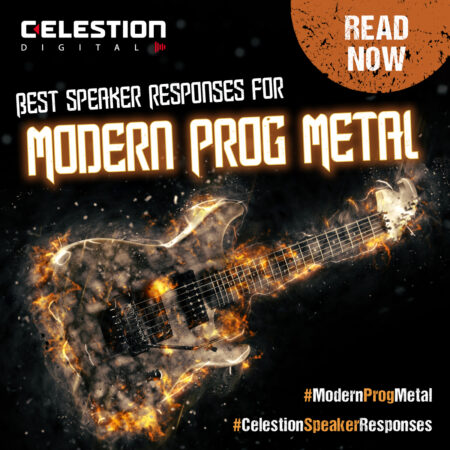 While some metal subgenres are broadly about being as heavy as aurally possible, that certainly isn’t the case when it comes to modern progressive metal. Blending aggression with more experimental arrangements and genre fusions, progressive music (be it rock or metal) has always looked forwards, carving its own path.
While some metal subgenres are broadly about being as heavy as aurally possible, that certainly isn’t the case when it comes to modern progressive metal. Blending aggression with more experimental arrangements and genre fusions, progressive music (be it rock or metal) has always looked forwards, carving its own path.
A wide-spanning genre classification, modern progressive metal spans from slightly older bands like Tool, Dream Theater, Meshuggah and Between the Buried and Me through to some of the younger artists mentioned below.
The guitar in particular has seen an incredible wealth of virtuosic talent arise from this genre umbrella over the last decade or so, through bands such as Periphery, Animals as Leaders, ERRA, Polyphia and Plini amongst many others.
By virtue of being a modern genre, it’s no surprise that players of modern prog metal have embraced the realm of digital gear and speaker responses, a forward-thinking gear approach to complement their playing style. In this blog, we’re going to break down our top Celestion IR & DSR recommendations for the genre along with some defining tone characteristics to listen out for.
Tune it Down Low
A consistent trend throughout modern progressive metal has been a drive for a guitar tone that is heavier and lower – for guitars this has meant thicker, and often more strings. It’s not uncommon for modern prog metal guitarists to opt for 7- or even 8-string guitars in lieu of the more common 6-string in order to accommodate lower tunings such as Drop A or Drop E.
As you can imagine, this also had a knock-on effect on their speakers of choice, as the speaker tone needs to accommodate frequencies much lower than a standard 6-string guitar whilst retaining a crisp and clear tone.
However, with speaker responses you aren’t as restricted when it comes to the physical characteristics of a speaker and how well it can handle lower frequencies. No matter how low you’re tuned or how loud you’re playing, you can’t damage an IR/DSR! So, feel free to experiment because in the digital realm everything is in play and you can focus solely on the tone.
Below are a couple of recommendations based on speakers whose tones especially complement downtuned guitars;
Constructed for refined low-end control, this guitar speaker delivers a tight, fat low end, laid-back treble and enough midrange character to deliver compelling lead lines.
A modern driver designed without the typical guitar speaker break-up to deliver a sonic signature with tight lows, neutral low-mids, defined upper-mids and well-controlled high treble, bringing-out the best from your playing, enabling you to shift from shimmering tubular-bell-like cleans to flute-like high gain with ease.
What on Earth is a ‘Djent’!?
Djent is sometimes described just as a feature of modern progressive metal and sometimes as a subgenre all by itself (we’ll leave the arguments at the door for today!). It’s defined by distorted, palm-muted, downtuned strings (the name itself is intended as an onomatopoeia of this sound, supposedly coined by Meshuggah guitarist Mårten Hagström).
As mentioned above, palm-muted breakdowns and syncopated rhythms are a cornerstone of modern prog metal. For this, you’re going to want a speaker tone that is short and snappy, with a short cutoff and little feedback allowing the rhythms to really pronounce themselves.
For this we recommend;
Surely one of the most recorded speakers of the last thirty years, the Vintage 30 does everything well with its complex mix of tight bass tones, meaty mids and detailed highs – in many ways this speaker IS the sound of Djent!
Probably the world’s best-selling premium 4×12 speaker, the G12T-75 is like a supercharged, tighter Greenback – the lows are big and punchy, with plenty of definition without being overly tight (or polite).
Soaring Leads and Sizzling Solos
Being a progressive genre by nature, it’s no surprise that experimental leads and solos feature heavily throughout modern progressive metal.
One tone characteristic to bear in mind is that often, while the solo is going on, so too is the often intricate rhythm section.
This means that the lead tone needs to be crisp and clear enough to cut above the rhythm section, without muddying the waters and clashing; allowing the listener to both discern and enjoy both guitar elements simultaneously.
For lead and solo tones, why not try;
Much loved for its speed, punch and articulation, the Classic Lead 80 maintains superb note definition even with immense distortion and has enough natural headroom to ring clean and clear to deliver an effortlessly dynamic performance.
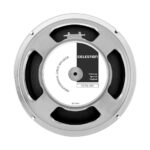
A versatile, modern speaker with a powerful, tight low end and a gritty, industrial feel. This is especially suited to high gain, distorted playing with excellent clarity and articulation, making this speaker great for lead solos or shredding. Turn down the gain and enjoy warm, melodic tones, perfect for clean playing.
Clean Can be Cool Too
While chugging distortion has long been a defining feature of modern progressive metal (and metal in general), clean tones have also carved their own space in the genre.
Often used as a tool for creating a spatial and otherworldly atmosphere (particularly when combined with chorus and/or phaser effects), clean tones are great for both rhythm sections and softer solos when distortion isn’t needed in the moment.
As an example, Polyphia especially have utilised clean tones (and in some cases, semi-acoustic) to wildly successful effect – composing intricate pieces of music that have flairs of neo-classical, jazz and hip-hop whilst retaining a guitar focus that is front and centre.
For modern prog clean tones, we recommend;
Supremely musical and three-dimensional sounding, the A-Type has a more laid-back midrange than many other guitar speakers, revealing body and complexity across the entire frequency spectrum, offering smooth articulation for clean tones and a thunderous low end as the gain turns up.
One of the finest multi-role guitar speakers ever made, the H series magnet gives this speaker superb control with tight bass, punchy, dynamic highs and harmonically complex Mids. Great for everything.
Celestion Speaker Responses for Modern Progressive Metal
More than just about any other genre, prog breaks down the classic conservatism of rock guitar – we may need tones that switch from super clean, heavily orchestrated happy-prime polyrhythmic sections to post-virtuoso legato shred in the space of a single piece of music. The speaker becomes an element of sound design, and so it’s fair to say that anything goes. What is pretty much impossible to achieve in the world of hardware speakers in big, heavy cabinets is a few clicks away in the virtual digital world, so try anything for anything and see what happens*.
While it’s almost a fool’s errand to try and encompass all the tone characteristics that coalesce to create a progressive music genre, we hope that this article has given you plenty of inspiration for achieving a modern, heavy, and progressive guitar tone!
*(If you want to keep it quick and simple, or if you need to do this in the real world, you can’t go too far wrong with a Vintage 30 and/or a G12H75!)
Click here to browse our full range of Celestion Speaker Responses


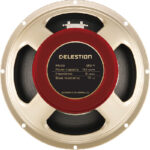 G12H-150 Redback
G12H-150 Redback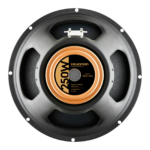 Copperback
Copperback Vintage 30
Vintage 30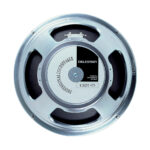 G12T-75
G12T-75 Classic Lead 80
Classic Lead 80 A Type
A Type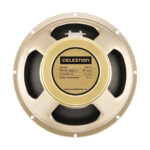 G12H-75 Creamback
G12H-75 Creamback